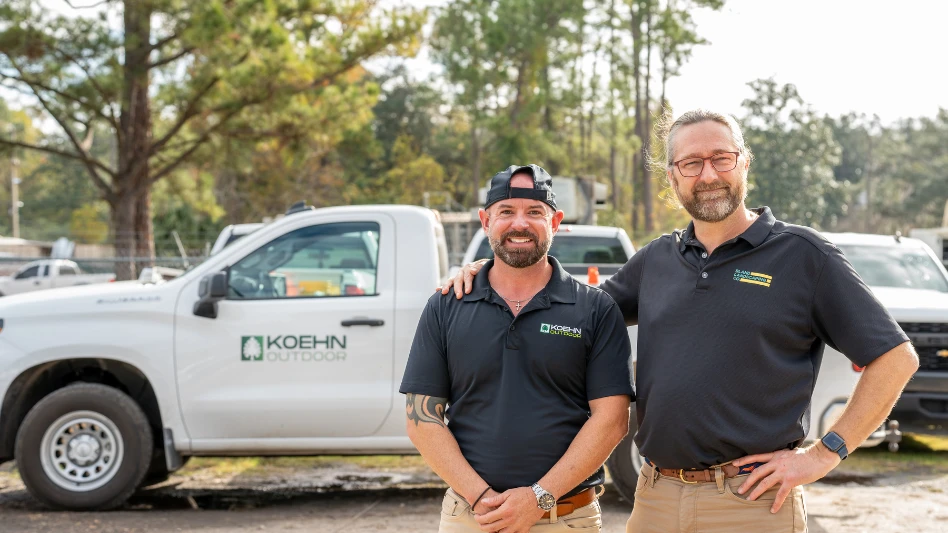Ron Kutter describes Alabama’s Gulf Shores/Orange Beach as a sleepy beach community. It boasts a tiny population, hordes of restaurants and condominiums, golf and fishing hot spots and, of course, gorgeous weather.
However, in the days after Sept. 16, 2004, this tight-knit, lower-Alabama locale looked nothing like a southern paradise. If anything, it resembled a virtual wasteland.
“Debris was everywhere,” says Kutter, recalling how Hurricane Ivan desolated his maintenance company’s service area. “When the storm surge came in, it went up to the second floor of the condos, and in some areas, sand was 6 feet deep. There was no power on the whole island.”
This was the aftermath of the worst storm to ever pummel coastal Baldwin County. Before Hurricane Ivan hit, Kutter and his maintenance team were happily en route to grossing $400,000 in revenue. Then, overnight, Kutter’s Grounds Maintenance’s client base was slashed from 60 commercial properties to eight, putting the business’s very existence in jeopardy.
“There was no grass left for us to cut,” Kutter says. “I slept on the floor of my shop for a few days and spent many restless nights wondering what I was going to do.”
And the maintenance company found an answer to his question right there in his shop. Sitting on his desk was an old motivational card with a picture of a tidal wave. The caption on the card read, “Ride the wave of change or find yourself beneath it.”
After Kutter saw that single sentence, he knew exactly how his business would begin generating new revenue.
“Honestly, it came to me right then,” Kutter explains. “I was going to figure out some way that I can survive with the equipment I have. So I met with a business owner who had storm plans – cleanup contracts already signed in case of a disaster – and from then on we had a new focus.”
That focus included an immediate shift away from the maintenance work upon which Kutter and his team built their reputations. Instead, he and his crew began cleaning condominiums, shoveling sand, hauling debris, doing demolition work and helping general contractors get properties back in order.
“At one time, I had 77 employees working for me – every unemployed front desk person, pool guy, retail clerk, waiter or cook,” Kutter laughs. “They were all digging out shrubs and palm trees and holding sledgehammers.”
Kutter’s Grounds Maintenance’s cleanup activities lasted for six months and helped double the company’s 2004 projected revenue to $829,000. But even after cleanup was complete, Kutter still had little grass to trim.
So he changed his business model again in 2005 – this time positioning Kutter’s Grounds Maintenance as a 100-percent landscaping company.
“Keep in mind that I knew that would be a short-term solution,” Kutter explains. “I just wanted to return to what I did. I wanted to get the properties back to the point where I could install plants, irrigation and grass that I could then mow.”
Short term or not, Kutter’s new landscape operation became an overwhelming success. Former maintenance crews were completing three or four projects at once, and the business generated $1.47 million in revenue. By the time all that landscaping matured in 2006, Kutter’s revenue jumped to $2.84 million, and he has since been able to restart his regular grass cutting business with even more success.
“Now I’m probably 70 percent maintenance again, and I’m up to 80 customers,” Kutter says.
As someone who brought his company back from the brink of collapse, Kutter offers this advice to those facing today’s financial tsunamis: “Always change and have a Plan B. Storms come and go. You just have to adapt to the situation.”
The author is a freelancer based in Pittsburgh, Pa.

Explore the April 2009 Issue
Check out more from this issue and find your next story to read.
Latest from Lawn & Landscape
- Terra Nova's Sedum Conga Line variety wins Best of 2024 Perennial award
- Different ways to distribute
- Case's 580EV electric backhoe loader wins Good Design Award
- Davey Tree promotes Dan Herms to VP, GM of Davey Institute
- Caterpillar's Cheryl H. Johnson set for April retirement
- Registration open for sixth annual Lawn & Landscape Technology Conference
- 12 interview questions to help you hire winners
- To Lease or Not to Lease





